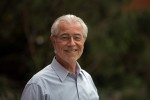News
2016-10-18 | permalink
Interview: Hans Herren calls for a radical transformation of agriculture
 IAASTD Co-chair Hans Herren (Photo: Peter Lüthi/Biovision)
IAASTD Co-chair Hans Herren (Photo: Peter Lüthi/Biovision)
We need a radical transformation of agriculture and industrial food systems to deal with future challenges, says Hans Herren, winner of the World Food Prize and Co-chair of the “International Assessment of Agricultural Knowledge, Science and Technology for Development” (IAASTD). In an interview published in the Foundation on Future Farming’s new brochure “Agriculture at a Crossroads, he takes stock of the IAASTD’s impact and looks at the current debate on food and farming systems. Herren says “the key option for action that came from the IAASTD report is that agriculture, on a global scale, needs to transition to agroecology as the way ahead to deal with the challenges of sustainable and equitable development.” According to Herren, who today is president of the Millennium Institute in Washington and the Swiss Biovision Foundation, the recognition that present agriculture and food systems are not in line with the need for a sustainable world have made it to the mainstream of international discussions. “It is very satisfying to see that the debate and action around agroecology has picked up momentum. The need for a radical reset towards sustainability in all three dimension, environmental, social and economic – these messages have been heard and made their way into the debate around food and farming systems. They are now slowly moving into mainstream, despite a very strong pushback by vested interest, agro-industry and large foundations.” However, Herren also points out that one of the IAASTD’s most ignored messages is the need to also radically transform industrial food systems. “It is still assumed that developed countries, with their unsustainable industrial agriculture and food systems have to ‘feed the world’. The message that countries need to maximize their own capacity to produce food and protect their own farmers, also addressed as food sovereignty, has yet to be taken into account in the agriculture and food policies of developed countries.” He added that also developing countries still need to make more efforts to implement the options for action outlined in the IAASTD. According to Herren, one of the main excuses for not introducing more radical changes is that this is too expensive. “The truth is that it is irresponsible not to spend money to transform the system now to agroecological and regenerative practices and science.” Herren refers to the Green Economy Report, published by the United Nations Environment Programme (UNEP) in 2011, which clearly demonstrated that IAASTD’s recommendations can be implemented by 2050 with spending only about a third of the total agricultural subsidies paid today. “We would still produce enough food in the quantity and quality needed to nourish well nine to ten billion people, while using less land and water,” he adds. But Herren remains optimistic: “I think that there is light at the end of the tunnel but we have to keep watching the politics that undermine the urgently needed transformation of agriculture. Positive developments can be seen in many places, more good science is being produced in support of sustainable agriculture as defined by the IAASTD but governments are still not ready to pay the bill for R&D in the area of agrocecology, organic, regenerative agriculture, leaving the work to NGOs.” Herren is also positive about the UN Sustainable Development Goals (SDGs) adopted last year. “The targets relating to agriculture and food are many and very relevant to support the needed transformation as was recommended in the IAASTD." He thinks "there is a tremendous opportunity to create synergies, given that agriculture and food are so closely linked to all sectors and sustainable development dimensions. It is now imperative that they are implemented without delays focusing on the food system, sustainable agriculture and agroecology.”

